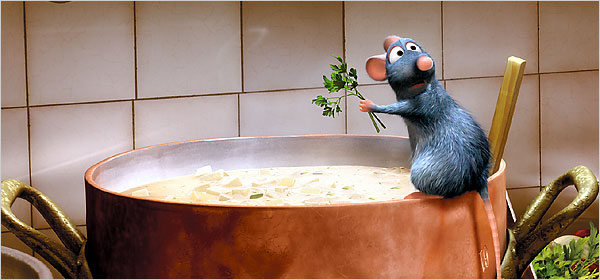Celebrating 10 years this month, Ratatouille is kind of a strange film. After all, the story centers on a French rat, Remy, who has grown tired with eating garbage, and more poignantly, with taking without ever giving anything back. He envies the human ability to create, and longs to do so himself. It is this longing that soon leads to shotgun blasts tearing through plaster and his entire colony being on the run, separating him from his father and brother. Eventually he finds himself in Paris and at the doorstep of the once revered Gusteau’s – the eponymous restaurant of his late TV mentor.
In other hands this animated tale about a rat, one of God’s filthiest creatures, wanting to cook might have been a horror film, or an unflinching documentary, but in Brad Bird’s (The Iron Giant, The Incredibles) the film is instead an ode to creation, and to those who create.
“Anyone can cook” is a statement that appears early and is central to the plot of Ratatouille. It is a core belief of the expired chef, Gusteau. It is these words that inspire Remy and infuriate former sous chef turned head chef Skinner (Ian Holm). Skinner is an elitist and gatekeeper, unbending in his conviction that not anyone can cook, that it takes not just talent, but a certain kind of person to cook. His hypocrisy is shortly laid bare by his willingness, nay, enthusiasm for using Gusteau’s likeness to sell cheap microwave cuisine, proving in the most literal sense (albeit unintentionally) that yes, anyone can cook.
He is also unable to veer away from the tried and true creations of his former mentor (and friend?), never daring to put his own stamp on it, because ultimately Skinner is a fake — he is fraud wrapped up in the trappings of the culinary world, and so he does the only thing he knows to do – he exploits. Once again he does not believe that anyone can cook, because he does not believe that he can cook.
It is into this environment that both Remy and Fredo Linguini arrive, orphans looking for a new home.
Linguini, the illegitimate child of Gusteau without a lick of the talent his father had, is the opposite of Skinner – he knows he has no talent, and is fine with it. He is happy to simply be near this world, taking out the garbage and mopping the floors while surrounded by the rich scents of fine French cuisine.
Remy, on the other hand, is the self-assured artist. He knows he has talent, but he also knows that no one will ever be able to see past his little rat feet and twitchy nose. Luckily, Linguini has a kind heart and is able to see past the exterior, finding the creative soul behind those friendly brown eyes. An unlikely partnership forms between a boy with simple dreams, and a rat with impossible ones.

Who wouldn’t let this little guy puppet them like a marionette?
But it’s a partnership that works. At least, after some trial and error, it does. And it works because Linguini is willing to be a vehicle for Remy’s passion, and Remy is willing to let go of some of his ego in order to realize his passion, in order to create the art that lives within. It speaks to the way art can touch us even if we are not able to create, or even to understand it. Linguini does not need to understand cooking in order to appreciate it. Linguini is the audience, passive and yet integral to the creative process; a vessel through which the spark of inspiration passes, changing it as it goes.
Linguini is also smart enough to understand the purity of what Remy creates. Once the restaurant passes to him, much to the chagrin of Skinner, he does away with the microwave dinners, and introduces a new menu curated by his “little chef”.1 Hubris of course comes into play, with Linguini allowing the show of it all to inflate his head, while Remy deals with his own sense of entitlement, which comes wrapped in the guise of responsibility.
It isn’t until famed food critic Anton Ego catches the scent of the newly revitalized and thriving Gusteau’s that the two cohorts are able to patch things up, finally understanding the true place each of them holds in this endeavour.
Serving Ego a dish that stimulates not just his taste buds, but his memory,2 Linguini and Remy are proven successful, and Remy is at last recognized as the true architect of Gusteau’s new found success. But this recognition comes at a cost – no matter how talented, Remy is still a rat, and rats in a kitchen are a serious health code violation. So Gusteau’s is shut down.

Anton Ego gets hit right in the taste-feels
In the denouement there is a pretty good burn at the expense of critics and the idea that it is far easier to tear something down than to create,3 but that no matter how sharp a barb may be, it will never have even an ounce of the power that creation can have on people. Bird doesn’t totally throw them under the bus though, walking it back a little to state that critics indeed can be a powerful force for good in the world of art – they can champion the new, the brave, and the strange. They can shine a light in dark corners to reveal that great art can come from anywhere, and anyone, and it is a disservice ignore it.
Of course, there are always those who will not understand, who may be disgusted, who may be indifferent or even hate it due to jealousy, but none of that matters. Make your art for yourself, and for any person you can find who will appreciate it.
And remember that anyone can cook.









